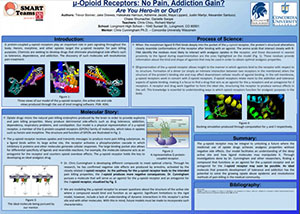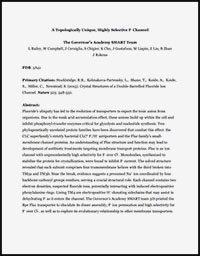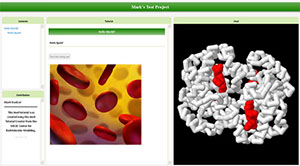4.) Capstone Experience
Reaching the Summit!
Teams are highly encouraged to present their protein stories to others to gain important experience in communicating their science. It takes a lot of skill to effectively explain to someone who has never heard of their protein all the cool science that they have been learning about for months without overwhelming their audience!
Many past teams have traveled to and presented at the Experimental Biology annual scientific conference. Keep an eye on the EB website during the academic year to see what opportunities your team might have to present.
Experimental Biology website: https://www.experimentalbiology.org/
Designing a Scientific Poster

If you plan to present your work at a local, regional, or national scientific meeting, a scientific poster is often a key requirement. Below are a collection of helpful resources to get you started.
- Scientific Poster Design (.pdf) - A nice PowerPoint from Cornell that includes guidelines and recommendations for making an effective scientific poster.
- MAPS Teams Logo (.png) - A transparent background version of the MAPS Teams logo. We encourage you to add it to your poster.
- Longamont High School Opoid (.pdf) - An example poster.
- The Governor's Academy Helicase (.pdf) - An example poster.
- Valders High School Photophatase (.pdf) - An example poster.
- Graphic Design Basics (video) - Coming Soon! Mark Hoelzer, Director of Digital Media at the MSOE Center for BioMolecular Modeling discusses how to make your poster both legible and visually attractive.
Writing a Scientific Abstract

Your MAPS Team will want to clearly communicate the protein story you have studied and modeled, and this often involves writing a scientific abstract.
Abstracts are, by definition, short. You might want to start with one sentence for each of the sections listed below, and then add additional sentences as needed.
- Introduction: What is the overall relevance of your protein of interest?
- Question: What is the particular story of your protein that your team will model?
- Findings: What answers to your question were you able to determine through your modeling project? Be specific as to what structural elements your team has modeled and how they are relevant to your story.
- Conclusion: How do your findings relate to the big picture? What important questions related to your protein story are still being actively researched?
Click here to see a sample abstract (.pdf)
Creating a Jmol Exploration Webpage

As more of the world moves onto online virtual environments, your team may also be interested in creating an interactive Jmol Exploration webpage as part of your capstone experience. These web pages can include a video of your team presenting your work, your abstract and key "Jmol buttons" that allow the viewer to see your protein design in a live interactive Jmol window embedded directly into the web page.
Below are a collection of helpful resources to help get you started.
- Jmol Exploration Creator Web App (web page) - This is the main webpage used to create custom Jmol Exploration web pages.
- Jmol Exploration Creator Help Page (web page) - This comprehensive user guide covers all of the features of the Jmol Exploration Creator. If you have never used the JEC before, this is a great place to start
- Introduction to the Jmol Exploration Creator (video) - Coming Soon! Mark Hoelzer, Director of Digital Media at the MSOE Center for BioMolecular Modeling walks through the basics of the JEC.


